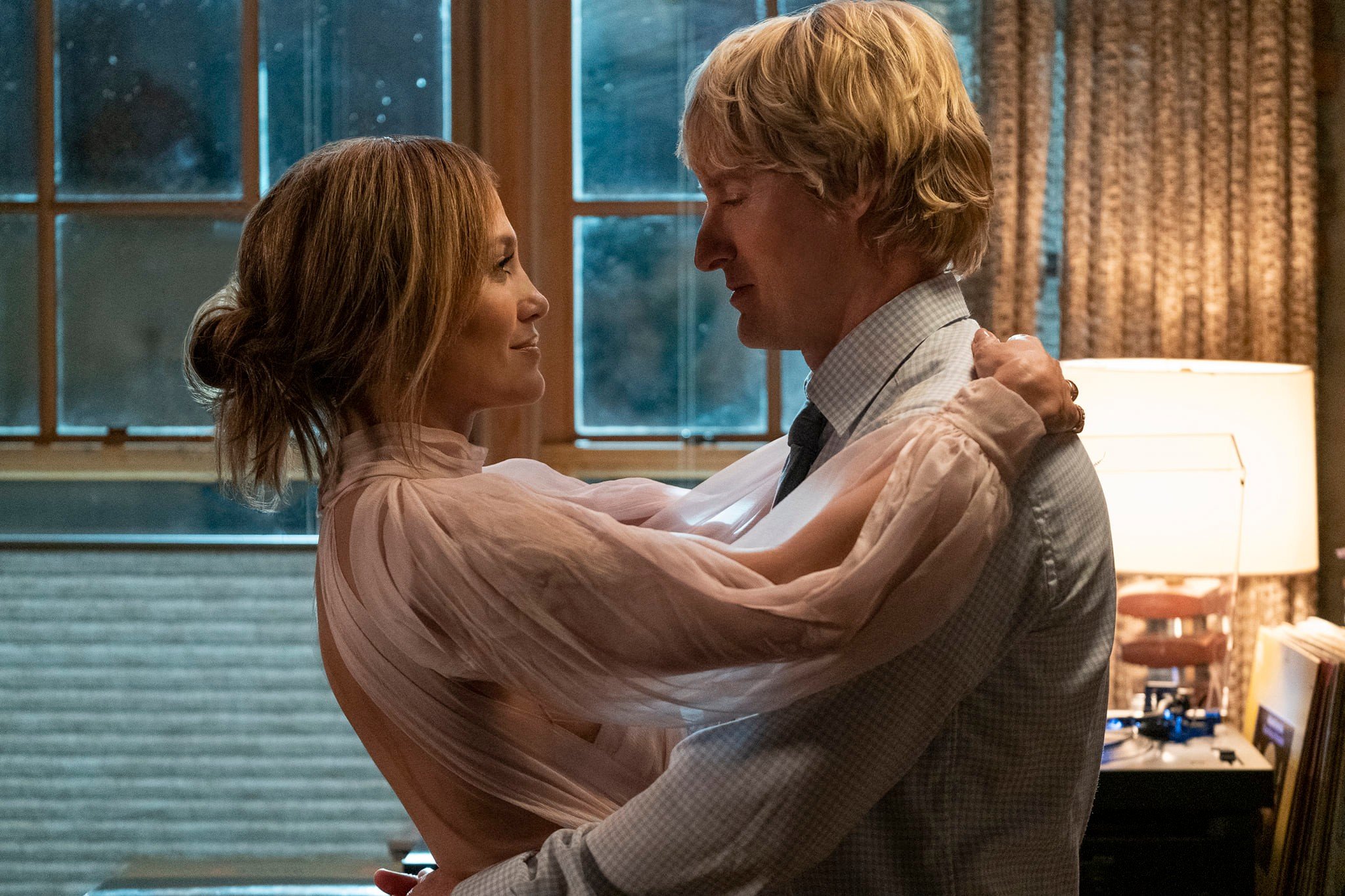It’s become fashionable to decry the death of the Romantic Comedy, but every article that starts with that headline goes on to publicize the next exception attempting to, purportedly, Frankenstein the genre. These articles often point out that Netflix is the last player in a dying game, providing us with the worst selection imaginable, from the Addison Rae vehicle She’s All That to yet another perky American small-business owner being wooed by a vaguely European prince (at Christmas, naturally). They tell us that the real ones – the high art of the late 80s to early 2000s and slightly more questionable but beloved iterations of the late 90s to mid-aughts – have ceased to be made.
That hasn’t stopped Jennifer Lopez, an expert in the field, from starring in two this year. In the first, Marry Me (February 11) a world famous pop singer (Lopez) is humiliated by her cheating fiancé just before their wedding-cum-concert and reacts by marrying an Average Joe (Owen Wilson) who has been dragged to the show by his adorable daughter. The second, Shotgun Wedding, is due out in June and partners Lopez with Josh Duhamel (re-cast after Armie Hammer’s assault allegations forced him to drop out) as they try to save their families – and relationship – from the kidnappers who crashed their destination wedding. Dun dun dun.
The key to a great romantic comedy is a combination of pitch-perfect acting and an excellent screenplay. Nancy Meyers, for example, whom people associate with the genre, was too focused on creating an aesthetic ‘feel’ and the relationships were backgrounded. The plot should never be overshadowed by its gimmick, if it even has one. In Notting Hill, Julia Roberts’ Anna Scott is a Hollywood actress, but she’s ‘also just a girl standing in front of a boy, asking him to love her’. Ten Things I Hate About You is based off of The Taming of the Shrew but ably creates its own poetry. The characters, too, have to be reasonably fleshed out. A 2016 New Yorker piece suggested that the heroine who once owned an independent bookstore might now work in marketing, insist that she ‘loved books’ and carry a Strand (read Daunt) book tote. The hero, meanwhile, who might have been a human rights lawyer now runs an app that ‘connects startups to lawyers’. Yes, today’s jobs tend to be ridiculous, but what, exactly, was Bridget Jones’ role at Sit Up Britain (and why was she not fired)? The characters themselves were idyllic but not unrecognizable. They weren’t self-conscious, and they had no sense of meta-ness, even if the movies they were in did. They weren’t naturally saccharinely sentimental, they were forced into it. They tumbled into love, as if their lives had suddenly been diverted from a straight course. In short, they existed in a world beyond the confines of the movie. Vanessa Hudgens’ triumvirate of Stacey, Margaret, and Fiona, however, do not live in a world that seems to exist beyond the boundaries of the Netflix screen. The Princess Switch, and movies of its ilk, are set in fairyland, not (an admittedly romanticized) Manhattan.
Dazzlingly witty dialogue (intended if not always successful) similarly defines the genre. The golden age variety are both recognizable and revolutionary, while the silver have moments of genuine humanity and humor. Nora Ephron’s ‘I love that you get cold when it’s seventy one degrees out, I love that it takes you an hour and a half to order a sandwich, I love that you get a little crinkle above your nose when your looking at me like I’m nuts…’ speech (When Harry Met Sally) became ‘You give me premature ventricular contractions… you make my heart skip a beat’ in No Strings Attached (by New Girl and – yes – Shotgun Wedding writer Elizabeth Meriwether). The scripts are specific and sweeping: no two romances are the same, nor can two declarations be. Though we live in an era of phenomenal screenwriters, big names like Phoebe Waller Bridge and Jeremy O. Harris are more interested in darker stories like No Time to Die or Zola. With what’s going on in the world, who can blame them? Maybe the next true stage of the quality romcom is the dark comedy romance. That may be confirmed when we finally get to see the reportedly excellent Worst Person in the World in March.
That said, traditional romantic comedies have been successful in dark times before. My Big Fat Greek Wedding, Maid in Manhattan, and Two Weeks Notice – all of which premiered in the shadow of 9/11 – are some of the most financially successful of all time. What’s more, My Big Fat Greek Wedding is, frankly, high comedic art. Contemporary darkness should not scare Hollywood away from investing in the genre. There is likewise reason to hope that a new crop might approach the heights of the past, and perhaps even begin to rectify the racial homogeneity that has left a stain on nearly every romcom of the past thirty years. Saturday Night Live breakout Bowen Yang and Comedy Central personality Joel Kim Booster are starring in Fire Island, an adaptation of Pride and Prejudice due out this summer. The hilarious Billy Eichner will star in Bros, the plot of which has yet to be revealed. I Want You Back arrived on Valentine’s day, which follows two dumpees (Charlie Day and Jenny Slate) working together to take back their exes (Gina Rodriguez and Scott Eastwood respectively); it also features a scene-stealing Manny Jacinto.
While culturally we may continue to fret about the beloved and derided genre that made Julia Roberts, Cameron Diaz, and Kate Hudson stars, know that whenever Valentine’s Day rolls around, you can turn to Woman of the Year, When Harry Met Sally, Hitch, The Proposal, Trainwreck, and whatever we’re next lucky enough to call our guilty pleasure.
Image Credit: Marry Me / Facebook



